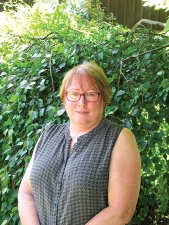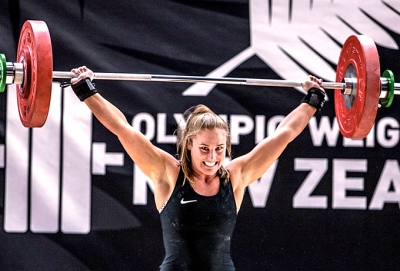Search

 Kim Morrison is retiring after 21 years working in Ashburton College’s Student Learning Support Unit. Photo Sue NewmanTeaching is a challenging job at any level, but Kim Morrison is one of a small group of people who opt to tackle the job of ensuring children with learning difficulties and behavioural issues also have an opportunity to learn. The Ashburton College Student Learning Support Unit learning support assistant Kim Morrison talks to reporter Sue Newman about her long and rewarding career.
Kim Morrison is retiring after 21 years working in Ashburton College’s Student Learning Support Unit. Photo Sue NewmanTeaching is a challenging job at any level, but Kim Morrison is one of a small group of people who opt to tackle the job of ensuring children with learning difficulties and behavioural issues also have an opportunity to learn. The Ashburton College Student Learning Support Unit learning support assistant Kim Morrison talks to reporter Sue Newman about her long and rewarding career.
Over the past 21 years Kim Morrison has made a difference in the lives of hundreds of youngsters, but come term one next year, she will no longer be the caring presence in Ashburton College’s Student Learning Support Unit.
The job quickly became a vocation for Kim, but after 21 years and three months of giving her working days to help youngsters with learning challenges, she’s decided it’s time to step back and enjoy some family time.
The mother of four watched her last child head to school and decided she was ready to return to the workforce, but wanted something that was challenging and rewarding rather than just a job that provided a pay packet.
She considered teacher training but knew that would be impossible with four boys in tow and decided working with students who needed additional support would provide the challenge she was looking for.
That was in the days when teacher aid funding was tagged to a student. If they moved school, you lost your job.
Kim started as a volunteer at St Josephs, moved to a paid position at Netherby and then an opportunity came up at the college. It was part time and for a mum with school age children, the hours were perfect.
“I’ve really learned this on the job and by attending courses and I’ve had some great head teachers along the way,” she said.
Her work is often rewarding and frequently challenging. It sees her working closely with between three and five students with a wide range of needs. Some spend part of their school day in the unit, others are there full time. And the age range is wide also – Year 9 through to high needs 21-year-olds.
While her job is about supporting her students’ learning, you inevitably become quite closely involved with their wider lives as well, Kim said.
“You do get attached to those students. My real passion has been the students with the highest needs. Their rewards don’t come easily, it can be the minutest thing, a look or a smile, but no matter what challenging behaviours you come across, there is always some good in everyone.”
It’s important to strike a rapport with students, particularly those who difficult behaviours, but even when you have that connection with your students, you still go home most days absolutely drained, she said.
“You learn coping mechanisms and you need a sense of humour and patience and you certainly need tolerance.”
As much as she builds relationships with her students, Kim said it’s also important to have a relationship with parents.
“I’ve had lots of interaction with them and they’re very supportive of what you’re doing. I really feel for them.”
There are never any guarantees in the student learning unit; no two days are the same.
“You can walk in and it’s lovely and cruisy and everything goes to plan but on another day you walk in the door and you want to walk straight back out, everything’s happening at once.”
Making the decision to leave wasn’t easy, but once made, Kim knew it was the right decision.
“I’ll miss it, but it was time. My passion has lessened over the past two years and when you’re not looking forward to it, then it becomes just a job and then it’s time to go,” she said.
“I’ll miss the kids big time, and the staff, we have some amazing staff here.”
The SLSU is as supportive of its staff as it is of its students, Kim said.
“We share ideas and we laugh, that’s the relief. If someone sees a situation that’s a bit crazy, where you need support, they’ll step in and take over and you can walk away and have a break. That happens rarely, but it does happen.”
She’s the longest serving member of the unit’s team and her staff in her unit describe her as highly respected in her role, dedicated, caring, hardworking, conscientious and capable, someone who always put students first.
After 21 years of giving her working days to students with learning difficulties, Morrison said it’s now her time to be a grandma. She plans to look after her grandchildren one day a week and do the after school run.
“It’s time I helped out my family but this job has been very satisfying and it makes me quite emotional when I look back, they’ve been wonderful young people.”
By Sue Newman © The Ashburton Guardian - 27 December 2017
 Ashburton Technical College Ag Class of 1961 reunion organiser Philip Crozier (left) with classmates Lloyd Robinson (seated) and Trevor Pawsey who travelled from Australia to attend. Photo Sue NewmanThe ‘ag’ class of 1961 could hold a New Zealand record they’re not even aware of.
Ashburton Technical College Ag Class of 1961 reunion organiser Philip Crozier (left) with classmates Lloyd Robinson (seated) and Trevor Pawsey who travelled from Australia to attend. Photo Sue NewmanThe ‘ag’ class of 1961 could hold a New Zealand record they’re not even aware of.
Fifty-six years ago 47 young teens started their secondary school lives at Ashburton Technical College.
They were the Ag Class of ’61.
Today all but two of those are still living and meet regularly.
Many still live in the Ashburton District but a reunion this week saw ex-classmates from as far afield as Southland, Nelson and Australia make it home for a Christmas get-together.
Philip Crozier has been the glue that has bound the ‘boys’ together.
He maintains a contact list for every classmate and he’s the person masterminding each reunion.
And this week’s get-together was one of the biggest yet with two teachers – Alan Packman and Bill Corbett also there to share classroom stories.
Students in the 1961 Ag Class were:
Geoff Linton, Graham Harris, Lloyd Robinson, Brian Davidson, Brian Digby, Keith Hood, Colin Reeves, Colin Maw, Ian Cartwright, Kevin Connolly, Keith Girvan, Ian Vessey, Philip Crozier, Alan Haslet, Alan Proctor, Rex Green, Graham Wells, Jim Petrie, Ian Lilley, John Knox, Alister Sutherland, Neil Connelly, Ian Joyce, Greg Prendergast, Alister Bird, Wayne Robertson, Larry Watson, Trevor Pawsey, Peter McMillan, Kevin Cartwright, Owen Haack, John Stewart, Michael Bartlett, Richard Reddicliffe, Graham Bishop and Tom Gundry, John Hands, George Brown, Neil Clucas, Bryan Wilkins, Peter Hulme, Murray Nordqvist, Wendy Blackler, John Linton, Derrick Connelly, Kenneth Chaney and Mathew Kirdy.
By Sue Newman © The Ashburton Guardian - 22 December 2017
 Hayley Whiting was back among the medals, this time at the Pacific Mini Games. Photo supplied.Weightlifter Hayley Whiting has picked up another medal as she continues her journey towards the top of the game.
Hayley Whiting was back among the medals, this time at the Pacific Mini Games. Photo supplied.Weightlifter Hayley Whiting has picked up another medal as she continues her journey towards the top of the game.
Whiting picked up a silver medal at the Pacific Mini Games earlier in the month, a result she said she was extremely pleased with.
“Looking at the level of the opposition it was the best I could do so I am really happy,” she said.
“The girl who won it was a lot better than me.
“With weightlifting every entrant has to give an entry weight for what they can lift and they are generally pretty honest so I knew that she was going to be better.”
Whiting lifted 78kg in the snatch, three below her competition best, while she was able to improve her best in clean and jerk to 98kg. The games were held in Vanuatu, with a local school serving as a makeshift village for the competitors.
“It was really interesting and beautiful as all the Pacific islands are,” she said.
“The village was a school and our accommodation was a classroom where they had taken all the desks and seats out and replaced them with bunk beds, so that was interesting.”
With Christmas and the New Year just around the corner, Whiting said competitions will die down for a while, but training will not, with her focus on preparing for plenty of competitions.
“With it being a Commonwealth Games year it is going to be very busy,” she said.
“Unfortunately I won’t be part of the New Zealand team for the Games but hopefully I can be selected for the Oceania Games.”
Whiting said selection for that competition will come down to how many competitors New Zealand elects to take.
“I would need to improve by a couple of kilos by then which I am confident I would be able to do,” she said.
“It might seem easy but actually making the gains up on the platform in competition can be quite challenging.
“Early on it can be easy to make kilo improvements at a time but later on it can be more difficult.”
By Jaime Pitt-MacKay© The Ashburton Guardian - 21 December 2017


